Collaborative Working in Health and Social Care
Notes:
Collaborative working is fundamental to conducting a positive and synergistic working environment in health and social care (Souza et al. 2016). The World Health Organisation (WHO) defines collaborative working in health and social care as the approach which enables different health and social care workers of diverse backgrounds to work together with families, caregivers, communities and patients thereby providing the highest standard of care (WHO, 2010). This presentation will make a comprehensive analysis of relevant theories on the motivation, communication and teamwork in health and social care for developing professional relationships among health professionals, offering healthcare dissertation help for deeper understanding of these concepts, thereby conducting collaborative working. Then this presentation will analyse that how the health and social care professionals can manage challenges and conflicts within team thereby improving their professional relationship to pose a positive impact on patient's care. Finally this presentation will analyse the importance of professional relationships in health and social care and how these relations can contribute to effective collaborative working.


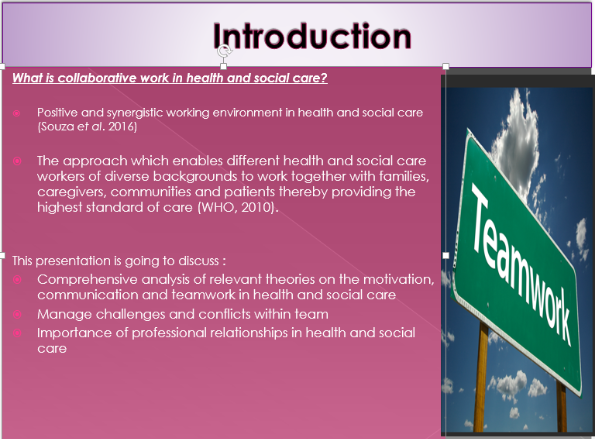

Different theories are developed by different authors to describe the team working, team spirit, and motivation in terms of promoting collaborates working in health and social care thereby promoting positive professional relationships amigo eat ad social care professionals. These theories are as follows:
Maslow’s Hierarchy of Needs:
Belbin’s theory of Team Roles:
Bruce Tuchman’s Model of Team stages:
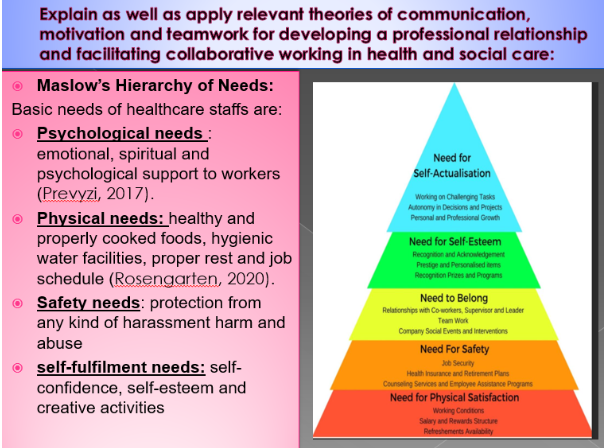
Maslow’s Hierarchy of Needs:
While it comes to promoting team's motivation in health and social care, this theory is highly relevant to motivate the health and social care staff by meeting all their basic needs (Roh et al. 2020). Under this theory, the health and social care authority must determine and meet the basic needs of the staff such as the psychological, physical, and emotional and self-fulfilment needs. Based on this theory, in the modern health and social care field, the motivation of health and social care workers is highly dependent on whether they are satisfied with the way their needs are met in the workplace (Rawson, 2020). Physiological needs of health and social care staffs are availability of healthy and properly cooked foods, hygienic water facilities, proper rest and job schedule. Another basic need is the safety needs of health and social care workers for which, the higher authority must ensure that all health and social care workers will be free from any kind of harassment harm and abuse (Rosengarten, 2020). Not only the physiological needs but also the psychological needs also need to be met in health and social care for providing emotional, spiritual and psychological support to workers. Self-actualisation needs of the health and social care staff are self-confidence, self-esteem and creative activities that must be supported and encouraged by the health care authority.
Through meeting these above-mentioned basic needs, psychological needs and self-fulfilment needs, health and social care workers can be motivated for working synergistically and collaboratively with their colleagues thereby sharing their skills, thoughts and decisions (Prevyzi, 2017). If all the basic needs of health and social care staff are met, they get a high level of job satisfaction, which encourages them to perform better in their work to provide the highest standard of care to patients. Moreover, by applying this theory the higher healthcare authority can make the positive transition of behavioural values and approaches of heath ad social care staff by keeping them motivated towards their professional accountability which enables them to maintain a positive professional relationship with the workplace.
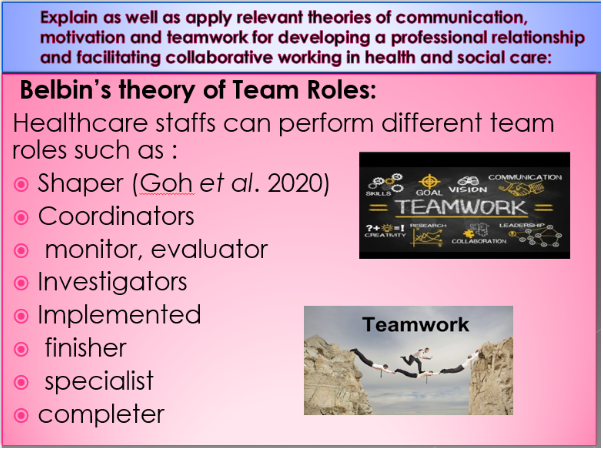
Notes:
Belbin’s theory of Team Roles:
This theory is relevant to the context of promoting collaborative working skills and effective professional relations within health and social care (Goh et al. 2020). This theory presents different team roles such as shaper, coordinators, monitor, evaluator, investigators, implemented, finisher, specialist and completer. Under this theory, while working within the team, different health and social care staff can perform different roles which direct them to achieve the ultimate organisational goals. Through performing each of these roles, health and social care staff can not only put their best effort into the workplace but also can make continuous professional development which will improve their ability to build a good professional and collaborative relationship with colleagues and patients.

Bruce Tuchman’s Model of Team stages:
This theory is highly applicable in the health and social care context, which assist modern health and social care professionals to adapt themselves within different team thereby building a collaborative and synergistic relation with team members (Macdonald et al. 2018). By applying the concept presented in this theory, health and social care professionals can pass through four major stages of teamwork such as forming, storming, norming and performing. In the very first stage, team members will know each other by understanding each other's decision-making process, work process, views and goals. This stage enables the health and social care staff to introduce themselves in front of their colleagues (Gosselin et al. 2019). The forming stage is important in health and social care which enables health and social care staff to avoid any kind of conflict and misunderstanding among team members thereby building collaborative and positive relationships with team members.
The second stage, the storming stage enables the team members of a health and social care team to confront opposite views and opinions of their colleagues. This stage is crucial for developing skills in team members to adapt themselves to the diverse opinions and work processes of different colleagues.
The norming stages are highly crucial for the health and social care professionals for establishing a sustainable relation with members and proceeding towards the common goal of the team. The last stage performing is the stage in which health and social care staffs are able to achieve team goals by carrying out collaborative work and developing a healthy and positive professional relationship with their colleagues.
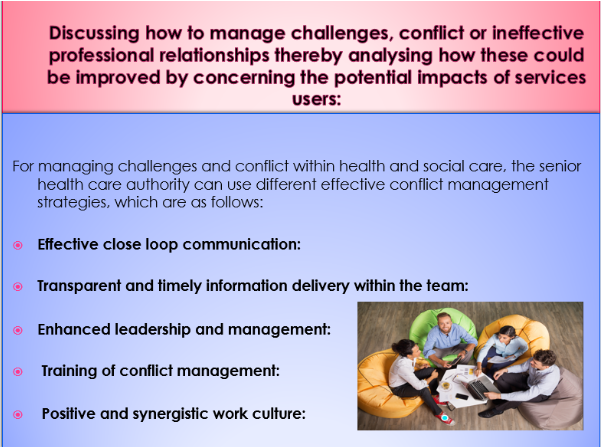
Notes:
For managing challenges and conflict within health and social care, the senior health care authority can use different effective conflict management strategies, which are as follows:
Effective close loop communication:
Closed-loop communication is the systematic communication process in which the sender sends any important message to the receiver and in return receive proper feedback from the receiver (Taskiran Eskici and Baykal, 2020). In health and social care, close loop communication is highly effective in managing team conflict thereby promoting collaborative working. By carrying out the closed-loop communication, health and social care professionals involved, the caregivers, doctors, families and patients to provide the necessary information and receive the relevant feedback from them (Anderson et al. 2019). This two-way communication avoids the risk of challenges or conflict with the healthcare team thereby improving the quality of care to service users by developing synergistic working.
Transparent and timely information delivery within the team:
Through maintaining a transparent information delivery system within the team, health and social care staff can ensure that all the necessary information regarding patients health and treatment process are shared with all the team members and high healthcare professionals (Lee et al. 2018). This strategy will reduce et risk of misinterpretation of statements and misunderstanding among staff thereby improving the productivity of the healthcare team to meet the holistic needs of services users.
Enhanced leadership and management:
Through improving the leadership framework within health care, health care professionals can direct the entire team to focus on the ultimate goal of the organisation rather than working on the individual goals. This process enables team embers to avoid unhealthy competition and opinion mismatches within a team, thereby improving the healthcare outcomes for patients. The enhanced leadership and management in healthcare will enable the healthcare leaders to lead the team members in the right way to improve their skill and professional standard to meet
Training of conflict management:
Through conducting training for health and social care staff for developing skills on how to manage different types of challenges or conflicts within the team, the quality of care delivery could be improved (Gosselin et al. 2019). Through attending proper training and skill development program, the health and social care staff can develop proper skills in using modern techniques and methods for avoiding any risk of conflict with the team thereby ensuring high-quality care delivery to patients.
Positive and synergistic work culture:
Positive and collaborative work culture is crucial for the health and social care staff to motivate them to maintain synergistic work relationships with colleagues (Gosselin et al. 2019). The positive, creative and synergistic work culture within the healthcare environment reduces the challenges or risk of misunderstanding. Unhealthy competition and disagreement among the team members thereby improving the work relation among them. Through developing a positive and collaborative work environment, health and social care staff can share their decision making, professional skill and abilities which improves the standard of care delivery to services users.
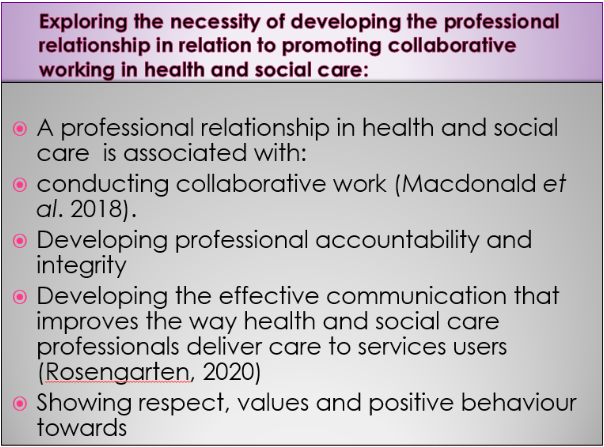
Notes:
A professional relationship is crucial in health and social care for conducting collaborative work (Macdonald et al. 2018). Professional relation among health and social care staff enables them to show professional accountability and integrity towards their colleagues. Professional integrity of health and social care staff is key to developing the effective communication that improves the way health and social care professionals deliver care to services users (Rosengarten, 2020). Through developing the professional relationship in the workplace, service providers can show respect, values and positive behaviour towards their colleagues and clients which enables healthcare providers to maintain a healthy and trustworthy relationship with their colleagues and patients.
In health and social care, the professional relationship among staff is important for developing healthy and transparent communication among them which enables them to maintain a continuous flow of necessary information within the team. Through building trustworthy and respectful relationships with colleagues, health and social care staff can maintain a high level of synergy by developing trust, love and respect among them

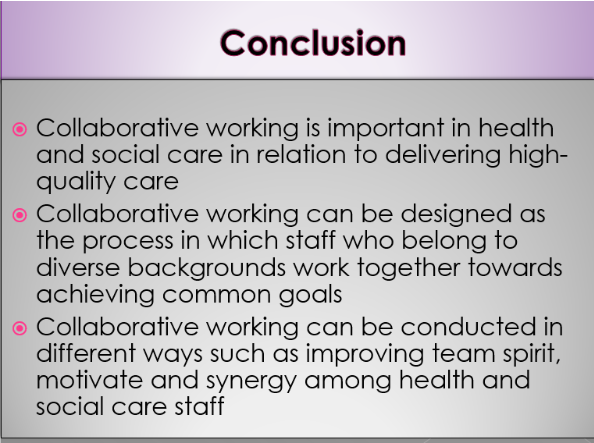
From the above-mentioned discussion, it can be concluded that collaborative working is important in health and social care in relation to delivering high-quality care. Collaborative working can be designed as the process in which staff who belong to diverse backgrounds work together towards achieving common goals. In health and social care, collaborative working can be conducted in different ways such as improving team spirit, motivate and synergy among health and social care staff. Collaborative working is also associated with many challenges in the workplace such as conflict and opinion mismatches among healthcare staff that can be solved by conducting effective communication, creative collaborative work culture and conducting conflict management training for health workers.
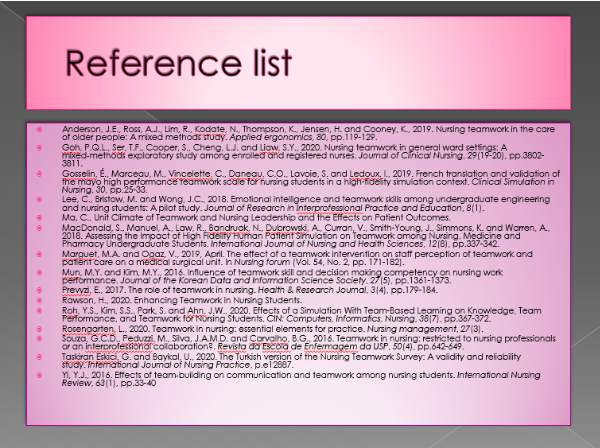
Take a deeper dive into Collaborative Scientific Research with our additional resources.
Reference list:
- Anderson, J.E., Ross, A.J., Lim, R., Kodate, N., Thompson, K., Jensen, H. and Cooney, K., 2019. Nursing teamwork in the care of older people: A mixed methods study. Applied ergonomics, 80, pp.119-129.
- Goh, P.Q.L., Ser, T.F., Cooper, S., Cheng, L.J. and Liaw, S.Y., 2020. Nursing teamwork in general ward settings: A mixed‐methods exploratory study among enrolled and registered nurses. Journal of Clinical Nursing, 29(19-20), pp.3802-3811.
- Gosselin, É., Marceau, M., Vincelette, C., Daneau, C.O., Lavoie, S. and Ledoux, I., 2019. French translation and validation of the mayo high performance teamwork scale for nursing students in a high-fidelity simulation context. Clinical Simulation in Nursing, 30, pp.25-33.
- Lee, C., Bristow, M. and Wong, J.C., 2018. Emotional intelligence and teamwork skills among undergraduate engineering and nursing students: A pilot study. Journal of Research in Interprofessional Practice and Education, 8(1).
- Ma, C., Unit Climate of Teamwork and Nursing Leadership and the Effects on Patient Outcomes.
- MacDonald, S., Manuel, A., Law, R., Bandruak, N., Dubrowski, A., Curran, V., Smith-Young, J., Simmons, K. and Warren, A., 2018. Assessing the Impact of High Fidelity Human Patient Simulation on Teamwork among Nursing, Medicine and Pharmacy Undergraduate Students. International Journal of Nursing and Health Sciences, 12(8), pp.337-342.
- Marguet, M.A. and Ogaz, V., 2019, April. The effect of a teamwork intervention on staff perception of teamwork and patient care on a medical surgical unit. In Nursing forum (Vol. 54, No. 2, pp. 171-182).
- Mun, M.Y. and Kim, M.Y., 2016. Influence of teamwork skill and decision making competency on nursing work performance. Journal of the Korean Data and Information Science Society, 27(5), pp.1361-1373.
- Prevyzi, E., 2017. The role of teamwork in nursing. Health & Research Journal, 3(4), pp.179-184.
- Roh, Y.S., Kim, S.S., Park, S. and Ahn, J.W., 2020. Effects of a Simulation With Team-Based Learning on Knowledge, Team Performance, and Teamwork for Nursing Students. CIN: Computers, Informatics, Nursing, 38(7), pp.367-372.
- Rosengarten, L., 2020. Teamwork in nursing: essential elements for practice. Nursing management, 27(3).
- Souza, G.C.D., Peduzzi, M., Silva, J.A.M.D. and Carvalho, B.G., 2016. Teamwork in nursing: restricted to nursing professionals or an interprofessional collaboration?. Revista da Escola de Enfermagem da USP, 50(4), pp.642-649.
- Taskiran Eskici, G. and Baykal, U., 2020. The Turkish version of the Nursing Teamwork Survey: A validity and reliability study. International Journal of Nursing Practice, p.e12887.
- Yi, Y.J., 2016. Effects of team‐building on communication and teamwork among nursing students. International Nursing Review, 63(1), pp.33-40
- 24/7 Customer Support
- 100% Customer Satisfaction
- No Privacy Violation
- Quick Services
- Subject Experts



